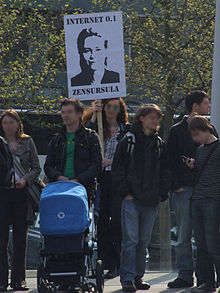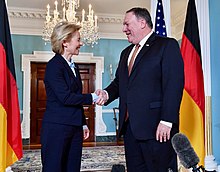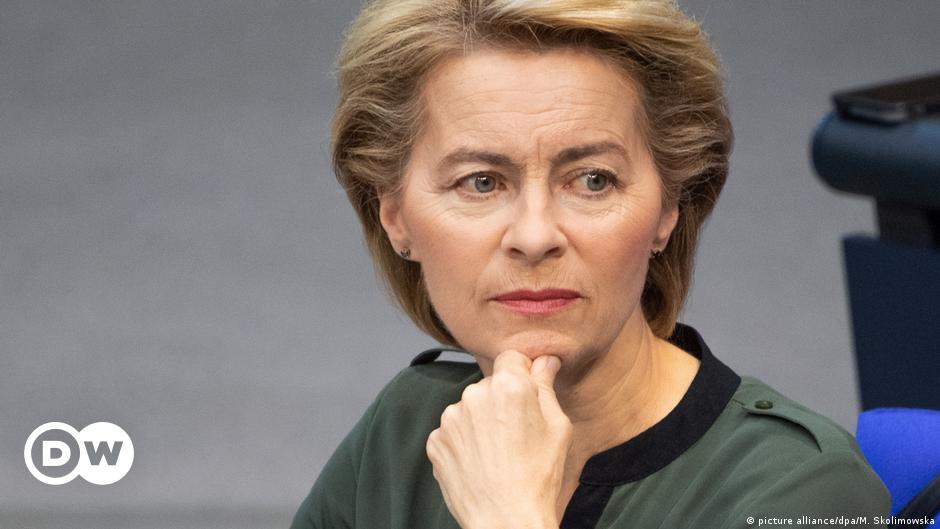Political views
Childcare and parental leave
Ursula von der Leyen assumed her office as
Federal Minister for Family Affairs, Senior Citizens, Women and Youth in 2005. Amidst much protest, particularly from the conservative wing of her own party, the
CDU, she introduced the
Child Advancement Act [
de] (
Kinderförderungsgesetz), which reserved 4.3 billion euros to create childcare structures throughout Germany.
[90]
Von der Leyen also introduced the German
Elternzeit, a paid
parental leave scheme which, following Scandinavian models, reserving two additional months for fathers who go on parental leave as well (
Vätermonate in German). This part of the law in particular attracted protest from some German conservatives.
Catholic Bishop Walter Mixa accused von der Leyen of turning women into "Birthing Machines", while
Bavarian colleagues from von der Leyen's sister party, the
CSU, complained that men did not need a "diaper-changing internship".
[91] Von der Leyen successfully influenced public opinion of her reforms with a 3-million-euro PR campaign, which was criticized for using public funds for political advocacy and for employing
embedded marketing techniques.
[92]
Blocking internet child pornography

Demonstration on 17 April 2009 against the planned mandatory blockage of
child pornography.
Ursula von der Leyen advocated the initiation of a mandatory blockage of
child pornography on the Internet through service providers via a block list maintained by the
Federal Criminal Police Office of Germany (BKA), thus creating the basic infrastructure for extensive
censorship of websites deemed illegal by the BKA.
[93]
These actions brought her the nickname "Zensursula", a
portmanteau word blending the German word for censorship ("Zensur") and her given name ("Ursula").
[94] The combination of a sensitive topic like child pornography and internet censorship is said to have caused a rising interest in the
Pirate Party.
[95]
In July 2009 she referred to the problems of struggling against paedophile pornography on the internet as the responsible persons often use servers located in
Africa or
India, where "child pornography is legal".
[96][97] This claim was based on a study by the
International Centre for Missing & Exploited Children in 2006;
[98] however, child pornography is in fact illegal in India. Indeed, Indian society has much
stricter rules about erotic media than Germany. She later expressed regret for having cited an inaccurate study.
[99]
Von der Leyen was in charge of the request to ban and the rating of the
Rammstein album
Liebe ist für alle da by the
Bundesprüfstelle für jugendgefährdende Medien.
[100]
Women board quota
In 2013, von der Leyen unsuccessfully campaigned for a statutory quota for female participation in the supervisory boards of companies in Germany, requiring company boards to be at least 20% female by 2018, rising to 40% by 2023.
[101]
Foreign policy

Von der Leyen with US Secretary of State
Mike Pompeo in 2018
Von der Leyen is a proponent of a more assertive foreign policy.
[102][103] One striking example was the decision in September 2014 to send arms to Kurdish and Iraqi security forces, which broke a longstanding taboo on Germany‘s dispatching of weapons to a conflict zone.
[43]
On the deteriorating relationship between Europe and Russia during the
2014 Crimean crisis, she argued that "the reliance on a functioning business relationship with Europe is much, much bigger in Russia" and that sanctions should prod the oligarchs and Russian business.
[104] She also called for greater
NATO backing of the
Baltic states amid the Crimean dispute.
[105]
Von der Leyen has supported close
security cooperation with
Saudi Arabia.
[106] German opposition parties criticized Germany's defense plan with Saudi Arabia, which has been
waging war in Yemen and was condemned for massive
human rights violations.
[107][108] In 2016, von der Leyen caused controversy after she refused to wear a
hijab while visiting Saudi Arabia. She said: "It annoys me when women are to pushed into wearing the
abaya."
[109]
Von der Leyen has in the past voted in favor of German participation in
United Nations peacekeeping missions as well as in United Nations-mandated
European Union peacekeeping missions on the African continent, such as in
Somalia – both
Operation Atalanta and
EUTM Somalia – (2009, 2010, 2011, 2012, 2013, 2014 and 2015),
Darfur/Sudan (2010, 2011, 2012, 2013, 2014 and 2015),
South Sudan (2011, 2012, 2013, 2014 and 2015),
Mali (2013, 2014 and 2015), the
Central African Republic (2014), and
Liberia (2015).
In 2017 von der Leyen noted that “healthy democratic resistance of the younger generation” in
Poland must be supported.
[110] In some Polish media it was understood that she instigated opposition aimed at overthrow of allegedly anti-democratic and authoritarian
PiS government; the statement was branded as scandalous.
[111] The
Polish Foreign Minister made sarcastic comments about “Prussian tone of the
Ode to Joy”.
[112] The Polish
Minister of Defence summoned the Germany military attache and demanded explanations.
[113] The German embassy in Warsaw and spokesman for the German defence ministry in Berlin issued conciliatory statements.
[114] The German media mostly ignored the incident; some acknowledged “minor slip of the tongue”
[115] on part of von der Leyen yet noted also that
German-Polish relations were “severely damaged”.
[116]
European integration
In a 2011 interview with
Der Spiegel, von der Leyen expressed her preference for "a
united states of Europe – run along the lines of the federal states of Switzerland, Germany or the USA" which would capitalize on Europe's size by agreeing on core issues relating to finance, tax and economic politics.
[117] Merkel slapped down von der Leyen, then labour minister, that same year for demanding Greece offer collateral for emergency loans to avoid possible default.
[1]
With 2014 marking the centenary of the start of
World War I, von der Leyen – in her capacity as defence minister – inaugurated a memorial for the
Armistice Day in
Ablain-Saint-Nazaire alongside French President
François Hollande and North Rhine-Westphalia State Premier
Hannelore Kraft, as well as British and Belgian officials.
[118]
In 2015, von der Leyen argued that a form of EU army should be a long-term goal. She also said that she was convinced about the goal of a combined military force, just as she was convinced that "perhaps not my children, but then my grandchildren will experience a
United States of Europe".
[119] In March 2015, she and her counterparts from
France and
Poland,
Jean-Yves Le Drian and
Tomasz Siemoniak, revived a meeting format intended to promote co-operation between the three countries in crisis zones by holding their first meeting between the
Weimar Triangle defence ministers since 2007.
[120] Following the
2016 European Union membership referendum in the United Kingdom, she argued that the UK had “paralysed” European efforts to integrate security policy and “consistently blocked everything with the label ‘Europe’ on it.”
[121] She has described Brexit as "a burst bubble of hollow promises."
[122]
Same-sex marriage
When the
Federal Constitutional Court ruled in favour of tax equality to same-sex couples in 2013, von der Leyen came forward in support of
equal adoption rights, arguing that "I know of no study that says that children growing up in same-sex partnerships fare any differently than children who grow up in heterosexual marriages or partnerships."
[123] In June 2017, von der Leyen voted against her parliamentary group’s majority and in favor of Germany’s introduction of
same-sex marriage.
[124]




